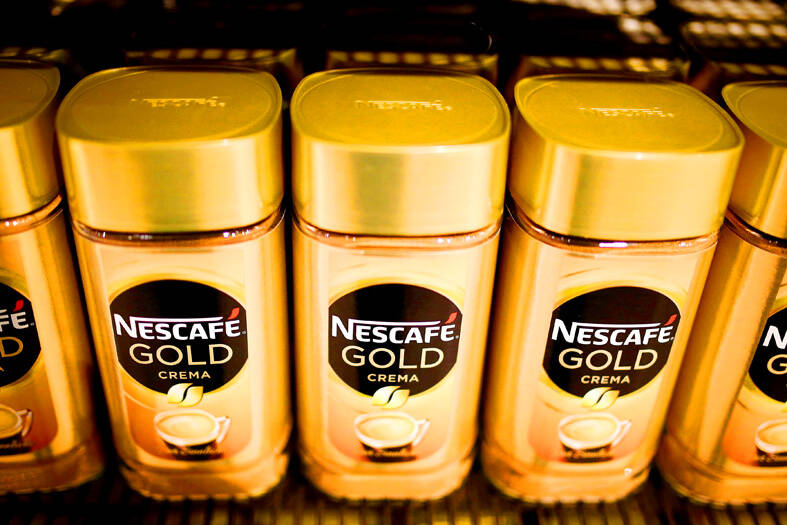Nestle SA chief financial officer Francois-Xavier Roger has forecast a challenging six months before inflation starts to ease in the second half of next year.
“We are likely going to go into a recession — we know that the next six months are probably going to be complicated and difficult,” the executive at the maker of Nescafe and KitKat said in a broad-ranging interview this month.
That would trigger a slowdown in consumption, he added.

Photo: Reuters
Consumer-goods groups like Nestle have been grappling with sharply higher input costs this year. Many have pushed through record price hikes, denting demand for their products. Rate hikes in major economies such as the US, the eurozone countries and the UK are an additional strain on households.
Further wage inflation and electricity prices rocketing in Europe would add pressure.
At an investor presentation in Barcelona, Spain, on Nov. 29, Nestle chief executive officer Mark Schneider said that the company had not been able to fully compensate for rising costs, adding that restoring its gross margin to previous levels will be harder if there is a recession.
“Certainly there will be quite a lot of inflation still at the beginning of next year and for the next six months after that,” Roger said. “I think probably in the second half of 2023 we may start to see some softening.”
Roger cited freight rates as a good indicator that a recession is around the corner.
The price to ship a maritime container on the benchmark Shanghai-to-Los Angeles route has plummeted to below US$2,000 from about US$10,000 at the start of the year, according to Drewry Shipping Consultants.
Nestle, the world’s biggest food company, expects to spend 1 billion swiss francs (US$1.1 billion) on investments such as more sustainable packaging and carbon reduction next year, an increase on almost SF800 million this year and SF500 million last year.
Environmental, social and governance reporting should soon become mandatory, Roger said.
Nestle is working to reduce its carbon footprint and achieve net zero by 2050 and a 20 percent reduction by 2025 compared to 2018. To do so, it is altering manufacturing and packaging practices in its supply chain, which accounts for 95 percent of its emissions. It is also investing in making more of its plastic packaging recyclable.
Roger said he is looking for a return on those investments, meaning that “we have an impact in terms of carbon reduction, in terms of plastic reduction, in terms of water reduction.”

PERSISTENT RUMORS: Nvidia’s CEO said the firm is not in talks to sell AI chips to China, but he would welcome a change in US policy barring the activity Nvidia Corp CEO Jensen Huang (黃仁勳) said his company is not in discussions to sell its Blackwell artificial intelligence (AI) chips to Chinese firms, waving off speculation it is trying to engineer a return to the world’s largest semiconductor market. Huang, who arrived in Taiwan yesterday ahead of meetings with longtime partner Taiwan Semiconductor Manufacturing Co (TSMC, 台積電), took the opportunity to clarify recent comments about the US-China AI race. The Nvidia head caused a stir in an interview this week with the Financial Times, in which he was quoted as saying “China will win” the AI race. Huang yesterday said

Nissan Motor Co has agreed to sell its global headquarters in Yokohama for ¥97 billion (US$630 million) to a group sponsored by Taiwanese autoparts maker Minth Group (敏實集團), as the struggling automaker seeks to shore up its financial position. The acquisition is led by a special purchase company managed by KJR Management Ltd, a Japanese real-estate unit of private equity giant KKR & Co, people familiar with the matter said. KJR said it would act as asset manager together with Mizuho Real Estate Management Co. Nissan is undergoing a broad cost-cutting campaign by eliminating jobs and shuttering plants as it grapples

The Chinese government has issued guidance requiring new data center projects that have received any state funds to only use domestically made artificial intelligence (AI) chips, two sources familiar with the matter told Reuters. In recent weeks, Chinese regulatory authorities have ordered such data centers that are less than 30 percent complete to remove all installed foreign chips, or cancel plans to purchase them, while projects in a more advanced stage would be decided on a case-by-case basis, the sources said. The move could represent one of China’s most aggressive steps yet to eliminate foreign technology from its critical infrastructure amid a

MORE WEIGHT: The national weighting was raised in one index while holding steady in two others, while several companies rose or fell in prominence MSCI Inc, a global index provider, has raised Taiwan’s weighting in one of its major indices and left the country’s weighting unchanged in two other indices after a regular index review. In a statement released on Thursday, MSCI said it has upgraded Taiwan’s weighting in the MSCI All-Country World Index by 0.02 percentage points to 2.25 percent, while maintaining the weighting in the MSCI Emerging Markets Index, the most closely watched by foreign institutional investors, at 20.46 percent. Additionally, the index provider has left Taiwan’s weighting in the MSCI All-Country Asia ex-Japan Index unchanged at 23.15 percent. The latest index adjustments are to